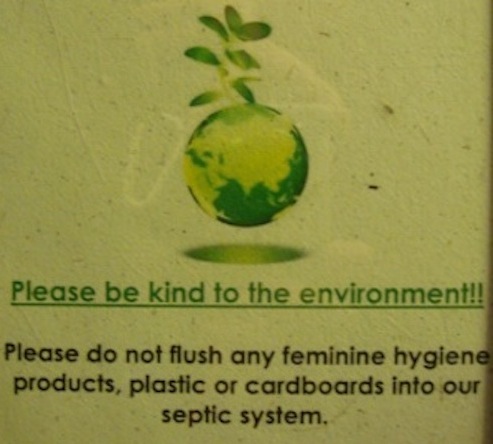They are both worthwhile, they are both difficult, and they are both routinely lied about.
This post is about sustainability and lies.
I got inspired to write about this topic by the sign below that I saw in a hotel bathroom the weekend before last.

Next to the toilet, there was one of those pretty little covered metal garbage cans that I always knock over when I try to use the foot pedal that opens the cover. Presumably the feminine hygiene products, etc. were to be deposited in it.
After reading the sign, I got to wondering whether the way the feminine hygiene products, etc. were disposed of after they were deposited in the garbage can was any kinder to the environment than flushing them down the toilet. No one at the hotel knew.
It turns out that the real reason the hotel did not want feminine hygiene products, etc. put in the toilet is that they blocked the septic system and caused flooding. That seemed to me to be necessary and sufficient reason to not put feminine hygiene products, etc. in the toilets without having to mention the much-invoked environment.
This kind of increasingly ubiquitous lie about sustainability is usually more thoughtless than intentional. Since everybody else does it, we reflexively cite the environment as a reason to do things. In many cases our purpose is much more to show the world that we are environmental good guys than to actually influence behavior.
Take, "Please consider the environment before printing this email." Has anyone ever forgone a hard copy that they really needed for environmental considerations? If you don't really need a hard copy, aren't there more compelling reasons for not bothering to print it than the environment.
There is another kind of being sustainable lie that is much more damaging -- the lie that being sustainable is good marketing. I am most familiar with this lie in travel, but I have seen it crop up in many other fields as well.
This second type of sustainability lie is particularly insidious because initially being sustainable can be good marketing, but (read this slowly) marketing through sustainability is not sustainable.
It's not as complicated as it sounds. Here's how it works:
- The real market for sustainability is the media, not the ultimate consumer.
- The media loves interesting stories about sustainability.
- Businesses that are able to create these types of stories get in the media.
- Businesses that get positive stories in the media get customers.
- The fact that some sustainable businesses have lots of customers creates the illusion that the customers are choosing theses business because they are sustainable, when they are actually choosing them because they are in the media.
- These businesses are held up as poster children for sustainability is good marketing.
- This induces other businesses to adopt sustainable practices to get more customers only to find that the media has no interest in the second businesses who are doing the same things that they (the media) already featured.
- To get ink you have to come up with a new sexy way to be sustainable.
- Before long new sexy ways to be sustainable are more expensive to implement than the benefits from the media exposure.
- This inflationary sustainability spiral leads to lying about sustainable practice, AKA green washing.
- At least for a while the media, hungry for feel good sustainability stories is not inclined to delve too deeply.
- Then, when the media loses interest in feel good sustainability stories, because they've, "been done," they turn to green-washing exposés, which give sustainability a bad name.
And that's why marketing sustainability is not sustainable.
This brings me to the other thing that being faithful to your spouse and being sustainable have in common: The more you do them and the less you talk about them the better.
If you talk about being faithful to your spouse, people will think of John Edwards and Arnold Schwarzenegger.
If you talk about being sustainable, people will wonder what kind of car you drive.
